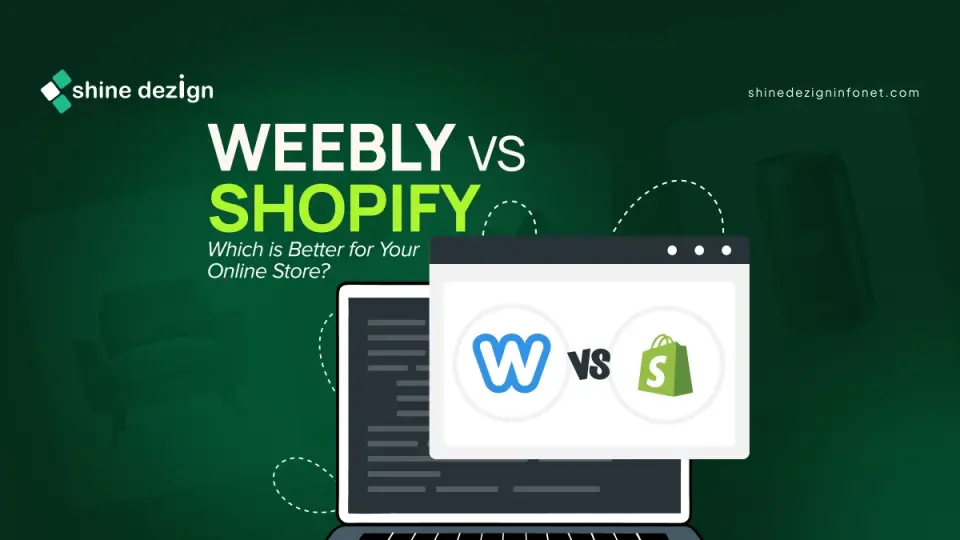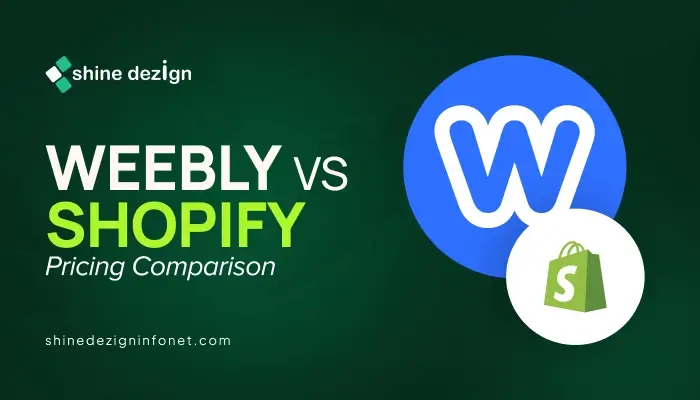Table of Contents
When it comes to building an online store, choosing the right platform is crucial for your success. Two popular options are Weebly or Shopify, each offering unique features and benefits tailored to different types of users. Shopify is renowned for its robust e-commerce capabilities, while Weebly is celebrated for its user-friendly website-building tools. In this article, we will compare these two platforms to help you make an informed decision about which one is best suited for your online business needs. With our Weebly vs Shopify comparison, you can make informed decisions.
Weebly vs Shopify
About Weebly
Weebly is a user-friendly website builder that allows individuals and businesses to create professional websites and online stores without needing extensive technical skills. It offers a range of customizable templates and tools designed to help users establish an online presence, grow their customer base, and manage their businesses effectively. Weebly is now part of the Squarespace product suite, enhancing its e-commerce capabilities and payment processing options.
About Shopify
Shopify is a leading e-commerce platform that empowers individuals and businesses to create and manage their online stores. It offers a user-friendly interface and a comprehensive set of tools designed to facilitate online sales, catering to a wide range of users from small startups to large enterprises. With Shopify, merchants can easily set up their storefronts, manage inventory, and process payments, making it a popular choice for those looking to establish an online presence.
Pros: Weebly vs Shopify
What are the Pros of Using Weebly?
User-Friendly Interface: The drag-and-drop functionality makes it easy for anyone, regardless of technical skill, to create and manage a website.
Affordable Pricing: Weebly offers a free plan along with various paid options, making it accessible for users with different budgets.
E-commerce Integration: The integration with Square enhances payment processing and order management, making it easier for users to sell products online.
Comprehensive Support: Users have access to a variety of support options, including live chat, email, and extensive online resources.
What are the Pros of Using Shopify?
User-Friendly Interface: Shopify’s intuitive design makes it accessible for beginners, allowing them to set up and manage their online stores with minimal effort.
Scalability: The platform is suitable for businesses of all sizes, providing the tools and resources necessary for growth, whether for small startups or large enterprises.
Robust App Ecosystem: Shopify boasts a vast app marketplace with over 13,000 applications that can enhance the functionality of online stores, allowing users to tailor their experience to their specific needs.
Strong Security: The platform prioritizes security, offering secure payment processing and data protection measures to safeguard both merchants and customers.
Regular Updates: Shopify continuously improves its platform by adding new features and enhancements, ensuring that users have access to the latest tools and technologies.
Cons: Weebly vs Shopify
What are the Cons of Using Weebly?
Limited Customization: While Weebly offers a range of templates, some users may find the customization options less flexible compared to other platforms.
Transaction Fees: Users may incur transaction fees when using certain payment processors, which can affect overall profitability.
Less Advanced Features: Compared to some competitors, Weebly may lack certain advanced features that more experienced users might require.
What are the Cons of Using Shopify?
Monthly Fees: Users must pay a monthly subscription fee, which can increase depending on the plan chosen and any additional features or Shopify apps utilized.
Transaction Fees: Shopify charges transaction fees for using payment gateways other than Shopify Payments, which can add to the overall cost of running a store.
Limited Customization: While Shopify offers customization options, some users may find them restrictive compared to fully self-hosted solutions, limiting their ability to create highly tailored experiences.
Learning Curve: Although the platform is user-friendly, some advanced features may require time and effort to learn, which could be a barrier for some users.
Comparison Table: Weebly vs Shopify
| Feature | Shopify | Weebly |
|---|---|---|
| Ease of Use | User-friendly but may have a learning curve | Intuitive drag-and-drop interface |
| E-commerce Features | Advanced e-commerce tools | All-in-one e-commerce solutions |
| Customization | Extensive customization options | Limited customization flexibility |
| Pricing | Monthly fees with transaction fees | Free plan available, various paid options |
| Support | 24/7 customer support | Dedicated Customer Support team |
| Mobile Optimization | Mobile-responsive themes | Automatically optimized for mobile |
| App Ecosystem | Over 13,000 apps available | Fewer apps compared to Shopify |
| Starting Price | $29/Month (Basic Plan) | $0/Month (Free Plan) |
Weebly Vs Shopify: Pricing
Weebly Cost
| Plans | Pricing | Best For |
|---|---|---|
| Free | $ 0/Month | Free SSL security and 3rd-party embed code. |
| Personal | $ 10/Month | Free plan + connect a custom domain. |
| Professional | $ 12/Month | Personal plan + unlimited storage, advanced site stats, remove Square Ads, password protection, and more. |
| Performance | $ 26/Month | Everything in the professional plan has enhanced benefits. |
Shopify Cost
| Plans | Pricing | Best For |
|---|---|---|
| Basic | $ 29/Month | 10 inventory locations, up to 77% shipping discount, 24//7 chat support, and in-person selling. |
| Grow | $ 79/Month | Everything is basic, along with up to 88% shipping discount and insurance with 5 additional staff accounts. |
| Advanced | $ 299/Month | Everything grows within the addition of 15 staff accounts, local storefronts by market, and 3rd party calculated rates. |
| Plus | $ 2300/Month | Everything in the advanced plan is more enhanced and prioritised. |
Weebly Vs Shopify: Features
Key Features of Weebly
Website Creation and Customization: Weebly provides an intuitive drag-and-drop interface that makes it easy for users to build and customize their websites. Users can choose from a variety of professionally designed themes and templates to create a unique online presence.
E-commerce Tools: The platform offers all-in-one e-commerce solutions, including order management, shipping, and payment processing. This simplifies the process of running an online store, allowing users to focus on growing their business.
Integrated Marketing Tools: Weebly includes marketing features that help users attract new customers. This includes tools for social media advertising, automated email campaigns, and SEO optimization to improve online visibility.
Mobile Optimization: Websites built with Weebly are automatically optimized for mobile devices, ensuring a seamless experience for users on smartphones and tablets.
Customer Support and Resources: Weebly provides access to a dedicated customer success team, along with a wealth of resources, including expert guides, blogs, and community events to help users overcome challenges and grow their businesses.
Key Features of Shopify
Store Creation and Customization: Shopify provides an intuitive online store editor that allows users to create and customize their stores without needing extensive technical knowledge. Users can choose from a variety of professionally designed themes and templates, such as the Yuva Shopify theme, enabling them to establish a unique brand identity that resonates with their target audience.
Sales Channels: The platform supports multiple sales channels, allowing merchants to sell products through their websites, social media platforms, and even in-person using Point of Sale (POS) systems. This flexibility enables businesses to reach a broader audience and maximize their sales potential.
Payment Processing: Shopify offers a secure and seamless payment processing system, supporting various payment options for customers. This ensures a smooth checkout experience, which is crucial for reducing cart abandonment rates and increasing conversions.
Marketing Tools: Integrated marketing features help users engage with their customers effectively. Shopify provides tools for social media marketing, email campaigns, and search engine optimization (SEO), allowing merchants to promote their products and drive traffic to their stores.
Analytics and Reporting: The platform includes comprehensive analytics and reporting tools that enable users to track sales performance, customer behaviour, and other key metrics. This data-driven approach helps businesses make informed decisions and optimize their strategies for better results.
Support and Resources: Shopify offers 24/7 customer support through various channels, including live chat and email. Additionally, the platform features an extensive help center, community forums, and educational resources, such as business courses, to assist users in navigating the e-commerce landscape.
What to Choose and Why: Weebly vs Shopify?
When deciding between Weebly and Shopify, consider the following factors:
Choose Weebly,
- If you are a small business or a startup looking for a straightforward way to establish an online presence, Weebly may be a better choice due to its ease of use and affordability.
- If your e-commerce needs are basic and you prefer a simple setup, Weebly can effectively meet those requirements.
- Weebly is a user-friendly platform, but it may not provide a high level of customization.
- If you are on a tight budget or just starting, Weebly’s free plan and lower-cost options can be appealing.
Choose Shopify,
- If you anticipate rapid growth or plan to scale your business significantly, Shopify’s robust e-commerce features and scalability make it a more suitable option.
- For businesses that require advanced e-commerce functionalities, such as multi-channel selling, extensive payment options, and detailed analytics.
- If having a highly customized and unique online store is essential for your brand, Shopify offers more flexibility in design and functionality.
- Shopify’s monthly fees can add up, especially if you opt for additional features or apps.
Conclusion
Both Weebly and Shopify offer valuable features for building an online store, but they cater to different needs. Shopify is ideal for businesses looking for advanced e-commerce capabilities and scalability, while Weebly is perfect for users seeking a straightforward website-building experience with integrated e-commerce tools. Ultimately, the choice between Weebly and Shopify will depend on your specific business requirements, budget, and technical expertise.


















